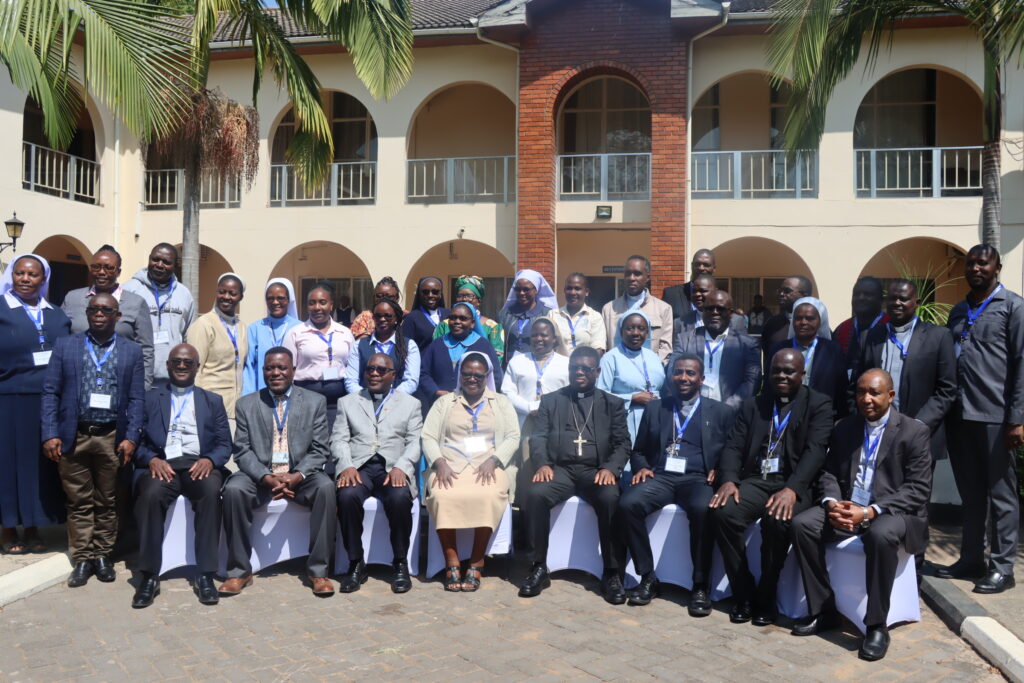AMECEA/CCC: Delegates to Care Convening Emphasize Reintegration and Family Strengthening

Group Photo; CCC Covening in Lusaka, Zambia
Mwenya Mukuka
Delegates from some AMECEA countries have gathered at Kapingila House in Lusaka for a two-day conference organized by the Association of Member Episcopal Conferences in Eastern Africa (AMECEA) and Catholic Care for Children. The conference delved into critical matters surrounding the reintegration and alternative care of children from childcare facilities. Under the theme “Strengthening Catholic Care for Children in the AMECEA Region; Reading the Signs of the Time Together,” participants engaged in thoughtful discussions and proposed strategies to address the evolving needs of vulnerable children.
One of the primary concerns raised by the delegates was the importance of creating awareness within parishes and communities about reintegration and alternative care methods. They stressed the significance of moving away from institutionalized childcare to family-based care for vulnerable children. Delegates also highlighted the need to revive and strengthen positive parenting within Small Christian Communities and family apostolates to foster healthy family dynamics.
Central to the discussions was the call for bishops’ conferences to advocate for government resources to support reintegration programs. Additionally, the delegates proposed robust resource mobilization efforts to sustain and improve child care facilities. Recognizing the power of storytelling, challenges, and successes, the participants recommended the establishment of a platform for sharing such experiences. They emphasized that collaboration between Catholic Care for Children, family apostolates, and other relevant organizations like the Pontifical Mission Society (PMS) could be facilitated through Catholic media.
Representatives from Kenya, Uganda, Malawi, Ethiopia, Tanzania, and Zambia shared their insights during the event. They collectively underlined the need for regular meetings and reviews of childcare practices within the region. The delegates expressed a commitment to address factors that lead to institutionalized child care, advocating for holistic care reforms in the Church.
Furthermore, the convene delegates recommended a renewed focus on family strengthening and marriage preparations. They articulated the need for economic empowerment within families and championed the idea of shifting from institutionalized care to family-based care for vulnerable children. Catholic Women Organisation delegates at the event pledged to raise awareness among women about this shift, aiming to encourage more women to adopt, foster, and become guardians for children in need.
The delegates underscored the importance of involving men in this endeavour, urging Catholic Men Organisations to embrace the concept of expanding their families through adoption and fostering. Collaboration with religious sisters who manage care homes was also encouraged, with a call for training to better understand the principles of Catholic Care for Children.
 Catholic Women Organization representatives pledged to champion the shift from institutionalized care to family-based care for vulnerable children. They planned to raise awareness extensively during Small Christian Community meetings and national level gatherings. This approach aims to ignite a passion among women to foster, adopt, and become guardians for these children, contributing to family strengthening.
Catholic Women Organization representatives pledged to champion the shift from institutionalized care to family-based care for vulnerable children. They planned to raise awareness extensively during Small Christian Community meetings and national level gatherings. This approach aims to ignite a passion among women to foster, adopt, and become guardians for these children, contributing to family strengthening.
The call for collaboration extended to Catholic Men Organization, where the delegates encouraged men to embrace the new family setup, welcoming non-biological children into their lives. Additionally, they appealed for training initiatives to improve understanding of Catholic Care for Children, involving clergy, religious individuals, catechists, and other key figures to enhance family spirituality and knowledge.
Delegates emphasized the importance of psychological preparation for both children and families during the reintegration process. They discouraged the establishment of new childcare facilities, instead advocating for the inclusion of care reforms and family strengthening in diocesan strategic plans. Recognizing the role of media, the delegates urged active involvement in disseminating information on reintegration.
Addressing concerns about young people, the conference participants stressed the need to include them in reintegration efforts, ensuring their perspectives are valued and integrated.
The conference took place from August 28th to 30th, 2023, at the Catholic Secretariat in Lusaka. The outcomes of this gathering serve as a testament to the commitment of AMECEA and Catholic Care for Children to create a more compassionate and family-oriented approach to child welfare across the region.
Ends///


